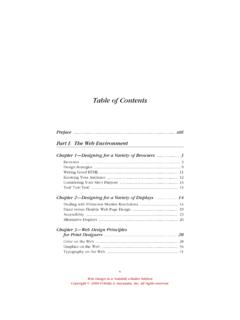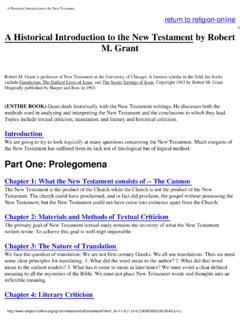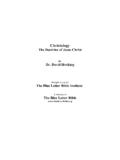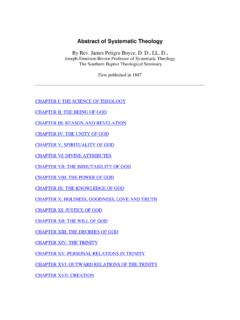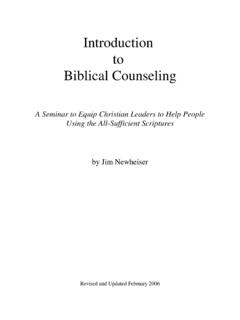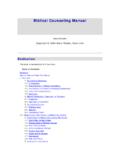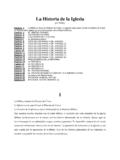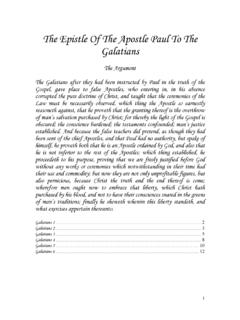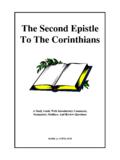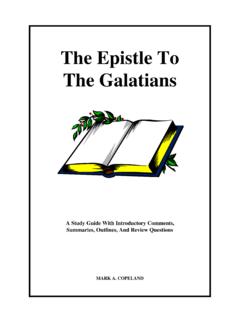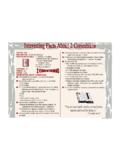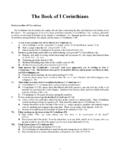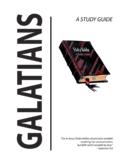Transcription of A Commentary on St. Paul s Epistle to the Galatians
1 A Commentary on St. paul s Epistle to theGalatiansbyMartin LutherAbout A Commentary on St. paul s Epistle to the Galatians by Martin LutherA Commentary on St. paul s Epistle to the GalatiansTitle: :Luther, Martin (1483-1546)Author(s):Graebner, Theodore (Translator)Grand Rapids, MI: Christian Classics Ethereal LibraryPublisher:The importance of this Commentary on Galatians for the history ofProtestantism is very great. It presents like no other of Luther s writingsDescription:the central thought of Christianity, the justification of the sinner for thesake of Christ s merits alone. We have permitted in the final revisionof the manuscript many a passage to stand which seemed weak andineffectual when compared with the trumpet tones of the Latin the essence of Luther s lectures is there. May the reader acceptwith indulgence where in this translation we have gone too far inmodernizing Luther s expression making him talk American.
2 The lectures which are preserved in the works herewith submittedto the American public were delivered in 1531.. A GermanPublication History:translation by Justus Menius appeared in the Wittenberg Edition ofLuther s writings, published in 1539. This translation and condensationpublished Rapids: Zondervan [1939]Print Basis:Project WittenbergSource:1999-01-05 Date Created:Robert Smith has a letter from Zondervanstating that the copyright was not renewed and the book is in thepublic Comments:Laura J. Hoelter (Transcriber)Contributor(s):Wendy Huang (Markup)All; Classic; Bibles; Proofed;CCEL Subjects:BS2685LC Call no:The BibleLC Subjects:New TestamentSpecial parts of the New TestamentPauline EpistlesTable of Contentsp. iiAbout This Book..p. 1 Title Page..p. 2 Preface..p. 4 From Luther s Introduction, 1538..p. 5 Galatians 1..p. 24 Galatians 2..p. 47 Galatians 3..p. 81 Galatians 4.
3 P. 104 Galatians 5..p. 128 Galatians 6..p. 137 Indexes..p. 137 Index of Scripture References..p. 138 Index of Scripture Commentary ..p. 138 Index of Names..p. 139 Index of Pages of the Print Edition..iiiMartin LutherA Commentary on St. paul s Epistle to the GalatiansivMartin LutherA Commentary on St. paul s Epistle to the Galatians A Commentaryon St. paul 's Epistleto the GalatiansbyMartin Luther A New Abridged Translation byTHEODORE GRAEBNER, of Philosophy and New Testament InterpretationConcordia Seminary, St. Louis, Missouri Martin LutherGalatiansiiiPREFACETHE preparation of this edition of Luther s Commentary on Galatians was first suggested to me byMr. P. J. Zondervan, of the firm of publishers, in March, 1937. The consultation had the twofoldmerit of definiteness and brevity. Luther is still the greatest name in Protestantism. We want you to help us publish some leadingwork of Luther s for the general American market.
4 Will you do it? I will, on one condition. And what is that? The condition is that I will be permitted to make Luther talk American, streamline him, soto speak because you will never get people, whether in or outside the Lutheran Church, actuallyto read Luther unless we make him talk as he would talk today to Americans. I illustrated the point by reading to Mr. Zondervan a few sentences from an English translationlately reprinted by an American publisher, of one of Luther s outstanding reformatory demonstration seemed to prove convincing for it was agreed that one may as well offerLuther in the original German or Latin as expect the American church-member to read anytranslations that would adhere to Luther s German or Latin constructions and employ theMid-Victorian type of English characteristic of the translations now on the market. And what book would be your choice?
5 There is one book that Luther himself like better than any other. Let us begin with that: hisCommentary on Galatians .. The undertaking, which seemed so attractive when viewed as a literary task, proved a mostivdifficult one, and at times became oppressive. The Letter to the Galatians consists of six shortchapters. Luther s Commentary fills seven hundred and thirty-three octavo pages in the WeidmanEdition of his works. It was written in Latin. We were resolved not to present this entire mass ofexegesis. It would have run to more than fifteen hundred pages, ordinary octavo (like this), sinceit is impossible to use the compressed structure of sentences which is characteristic of Latin, andparticularly of Luther s Latin. The work had to be condensed. German and English translations areavailable, but the most acceptable English version, besides laboring under the handicaps of anarchaic style, had to be condensed into half its volume in order to accomplish the streamlining of the book.
6 Whatever merit the translation now presented to the reader may possess should bewritten to the credit of Rev. Gerhardt Mahler of Geneva, , who came to my assistance in avery busy season by making a rough draft of the translation and later preparing a revision of it,which forms the basis of the final draft submitted to the word should now be said about the origin of Luther s Commentary on Reformer had lectured on this Epistle of St. paul s in 1519 and again in 1523. It was hisfavorite among all the Biblical books. In his table talks the saying is recorded: The Epistle to theGalatians is my Epistle . To it I am as it were in wedlock. It is my Katherine. Much later when afriend of his was preparing an edition of all his Latin works, he remarked to his home circle: If Ihad my way about it they would republish only those of my books which have doctrine. MyGalatians, for instance.
7 The lectures which are preserved in the works herewith submitted to the American public weredelivered in 1531. They were taken down by George Roerer, who held something of a deanship atWittenberg University and who was one of Luther s aids in the translation of the Bible. Roerer2 Martin LutherGalatiansvtook down Luther s lectures and this manuscript has been preserved to the present day, in a copywhich contains also additions by Veit Dietrich and by Cruciger, friends of Roerer s, who with himattended Luther s lectures. In other words, these three men took down the lectures which Lutheraddressed to his students in the course of Galatians , and Roerer prepared the manuscript for theprinter. A German translation by Justus Menius appeared in the Wittenberg Edition of Luther swritings, published in cannot discuss this famous document of the Reformation Age without adverting of theexperience of John Bunyan.
8 Greatly afflicted on account of his original and inward pollution andwretched in the knowledge of his transgressions, Bunyan looked around for some ancient workthat might satisfy him. He had found that the writers of his own day had not gone down themselvesinto the deep. Rummaging around he found an old copy, ready to fall to pieces, of Martin Luther sCommentary on Galatians . He says When I had but a little way perused, I found my condition inhis experience so largely and profoundly handled, as if his book had been written out of my prefer this book of Martin Luther on the Galatians (excepting the Holy Bible) before all the booksthat ever I have seen, as most fit for a wounded conscience. The importance of this Commentary on Galatians for the history of Protestantism is very presents like no other of Luther s writings the central thought of Christianity, the justification ofthe sinner for the sake of Christ s merits alone.
9 We have permitted in the final revision of themanuscript many a passage to stand which seemed weak and ineffectual when compared with thetrumpet tones of the Latin original. But the essence of Luther s lectures is there. May the readeraccept with indulgence where in this translation we have gone too far in modernizing Luther sexpression making him talk American. And may the divine blessing rest upon this, we trust,even in its new dress, eloquent disquisition of Martin Luther on those central doctrines upon whichthe Christian church depends for its inner life and for success in its evangelical the end of his lectures in 1531, Luther uttered a brief prayer and then dictated two Scripturaltexts, which we shall inscribe at the end of these introductory remarks: The Lord who has given us power to teach and to hear, let Him also give us the power to serveand to do.
10 LUKE 2 Glory to God in the highest,And on earth peace,Good will to 40 The Word of our Godshall stand forever. Theodore GraebnerSt. Louis, Missouri 3 Martin LutherGalatiansFROM LUTHER S INTRODUCTION, 1538In my heart reigns this one article, faith in my dear Lord Christ, the beginning, middleand end of whatever spiritual and divine thoughts I may have, whether by day or by LutherGalatiansCHAPTER I9 VERSE 1. paul , an apostle, (not of men, neither by man, but by Jesus Christ, and God the Father,who raised him from the dead).St. paul wrote this Epistle because, after his departure from the Galatian churches,Jewish-Christian fanatics moved in, who perverted paul s Gospel of man s free justification byfaith in Christ world bears the Gospel a grudge because the Gospel condemns the religious wisdom ofthe world. Jealous for its own religious views, the world in turn charges the Gospel with being asubversive and licentious doctrine, offensive to God and man, a doctrine to be persecuted as theworst plague on a result we have this paradoxical situation: The Gospel supplies the world with the salvationof Jesus Christ, peace of conscience, and every blessing.
